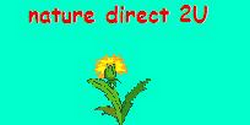Copy of `Nature Direct 2U - Medical Terms`
The wordlist doesn't exist anymore, or, the website doesn't exist anymore. On this page you can find a copy of the original information. The information may have been taken offline because it is outdated.
|
|
|
Nature Direct 2U - Medical Terms
Category: Health and Medicine > Medical Terms
Date & country: 08/01/2008, UK
Words: 241
|
RelaxantTends to relax and relieve tension, especially muscular tension and produces relaxation.
ResolventPromotes the resolving and removing of swellings & abnormal growths, such as a tumour.
RestorativeRestores consciousness and/or normal physiological activity.
RhinitisInflammation of nasal mucosa.
RubefacientAn agent that causes reddening or irritation when applied to the skin.
SaponinA glycoside compound in plants, which, when shaken with water, has a foaming or 'soapy' action.
Scald headRingworm, or some similar affliction, of the scalp. May also refer to a disease of the hair follicles with formation of small yellow crusts and a very offensive odor; usually affects the scalp.
ScorbuticConcerning or affected with scurvy.
ScrofulaTuberculosis involving the lymph nodes of the neck, usually occurs in early life.
SedativeCalms the nerves, anxiety, allays excitement, induces relaxation, promotes drowsiness and is conducive to sleep.
SialagoguePromotes the flow of saliva.
Sleeping diseaseSleeping sickness; commonly found in Africa. Also viral encephalitis in which lethargy is a prominent feature.
SoporificHerbs that help to produce sleep.
SpasmolyticChecking spasms or cramps.
SpecificA remedy having a curative effect on a particular disease or symptom.
SpermatorrheaAbnormally frequent involuntary loss of semen without orgasm.
SpondylosisAbnormal immobility and fixation of vertebral joints.
StimulantAn agent that causes increased activity of another agent, cell, tissue, organ, or organism.
StomachicSubstances which give strength and tone to the stomach. Also used to stimulate the appetite.
StranguryA slow and painful passage of the urine due to spasm of the urethra and urinary bladder.
StypticChecking bleeding by contracting blood vessels.
SubcostalBeneath the ribs.
SudorificHerbs that promote or increase perspiration.
TeratogenA substance that can cause the deformity of a fetus.
TettersA once popular name for various eczematous skin diseases. May also refer to a skin disease of animals communicable to man with intense itching.
TinctureA diluted alcohol solution of plant parts.
Tinea capitisFungal skin disease of the scalp.
TisaneA term used frequently in Europe referring to popular herbal infusions, such as chamomile flowers etc., which are commonly taken as a beverage or for mildly medicinal effects.
TonicAn ambiguous term referring to a substance thought to have an overall positive medicinal effect, typically strengthening and revitalising the body or specific organs. (see adaptogenic).
TranquiliserCalms the nerves.
TuberculostaticArresting the tubercle bacillus (the germ responsible for causing tuberculosis).
UterotonicHaving a positive effect on an unspecified nature of the uterus.
VasoconstrictorAn agent that causes blood vessels to constrict, or narrow the calibre.
VasodepressantLowers blood pressure by dilatation of blood vessels; having a depressing influence on circulation.
VasodilatorAn agent that causes blood vessels to relax and dilate.
VermicidalHaving worm-killing properties; an agent that kills worms; a vermifuge. Also Vermicide.
VermifugeHaving worm-killing properties; an agent that kills intestinal worms.
VesicantAn agent that causes blistering, such as poison ivy.
VulneraryAn agent or herb used for healing wounds, sores, fresh cuts etc., usually used as a poultice.
WhitesSee leukorrhea.
ZymoticCaused by or pertaining to any infectious or contagious disease.

